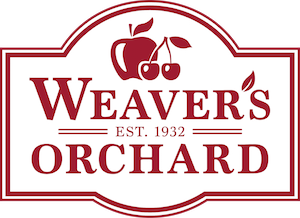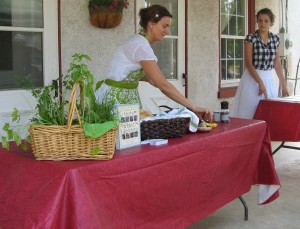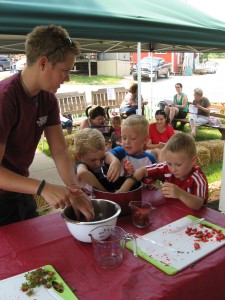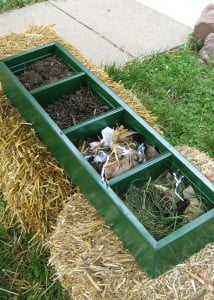Now and then I’ve been inspired to take cooking classes. Sometimes, walking past a bustling kitchen store, I’d hear laughter rise on a night it hosted cooking classes, or I’d sample fresh homemade cheese crafted by a friend who attended culinary school, and I’d think of signing up for a class. My time and budget stars never aligned, though, and the closest I came to really educating myself about food was reading a Cook’s Illustrated article about making sourdough bread, which I soon decided involved entirely too much commitment to a lump of dough, no matter how tasty that dough would be after daily care.
Imagine how happy I was to discover that Weaver’s Orchard was hosting absolutely free cooking and gardening classes this summer, the first Wednesday of every month from June-September! No extensive registration required, no cost, no experience necessary– just a series of classes from local cooking and gardening professionals. I attended June’s event, and on July 6 from 11 a.m.- 2 p.m., I will definitely take my seat on a straw bale or bench outside the Weaver’s farmhouse for July’s classes.
At June’s First Wednesdays on the Farm, we learned how to cook with fresh herbs and vegetables, to help kids help their mothers make jam and preserves, and to start a backyard compost pile.
Dr. Marisa Bosler Teaching About Cooking with Herbs & Vegetables
The skills taught were important, and sometimes complex, yet each of the classes’ teachers took an encouraging and laid-back approach to kitchen and garden skills.
Dr. Marisa Bosler of Bosler Nutrition and her assistant Brynn Witman brought generous samples of the grilled vegetable sandwiches she taught the class to make, which definitely proved that cooking with fresh herbs and vegetables does not mean sacrificing taste!
Bosler works herbs into her bread dough and makes her own herb and tomato butter. She makes sprouted grain bread in a brick oven and recommends grilling thick slices of vegetables, brushing them with olive oil after grilling, and not grilling the tomato and basil components of the sandwich at all– all to improve the flavor and texture of the sandwich.
The class was informative as well as delicious– Bosler related her long battle with Lyme Disease and her discovery that “you can get better” and can use food to help the body heal itself. She described the benefits of each herb, asked her audience questions, invited volunteers and took questions.
Lisa Domalski Engages the Kids in Her Strawberry Jam Demonstration
Lisa Domalski’s lively class followed soon after Bosler’s and a troop of kids came to help her make and can strawberry jam. Domalski, one of Weaver’s pick-your-own fruit employees and a home-canning devotee, gave the class samples of her sweet homemade strawberry jam atop Weaver’s shortcake–a sure way to earn the class’s attention!
Domalski gathered a willing and wiggling group of small helpers who sliced strawberries with plastic knives and then watched from their seats as the strawberries turned to jam.
True to her own “modern-day, let’s-get-it-done” philosophy of cooking, Domalski’s presentation was full of practical and laid-back advice. While canning, “You can try not to make a mess,” she said, “but why stress about it?” Her class was perfect for busy moms, and so delicious and engaging that one kid asked about halfway through, “Mom, can we make this at home?”
Penn State Master Gardeners Demonstrate How to Compost
Many of the kids also came to learn the technical and practical sides of composting, having heard about composting from the Curious George TV episode “Mulch Ado About Nothing.” The kids, and other gardeners, learned from the best: Elizabeth Finlay of the Penn State Master Gardeners Program. Finlay made the science of composting accessible, offering detailed expertise that was still easy for beginning gardeners like me to follow.
She covered the best ways to start composting, and especially how to maintain the right balance in the compost pile by using some nitrogen-rich “greens” like vegetable scraps with an abundance of carbon-rich “browns” like dried leaves and even office paper. She also covered what not to compost–no meat, oil, pet manure or anything that came in contact with those things.
Needless to say, after a day of varied, lively and informative free food and garden classes, I’m looking forward to another day in front of the farmhouse on July 6. We’ll be learning the best ways to cook with raw root vegetables, making your own baby food and understanding how to draw pollinating insects to the garden.
If you have kids, stop by early, at 10 a.m., to pick raspberries and hear a story (Read & Pick Storytime is $5 and you get to pick a container of raspberries!) and stay until 2 p.m. to gain a wealth of culinary and garden knowledge.



